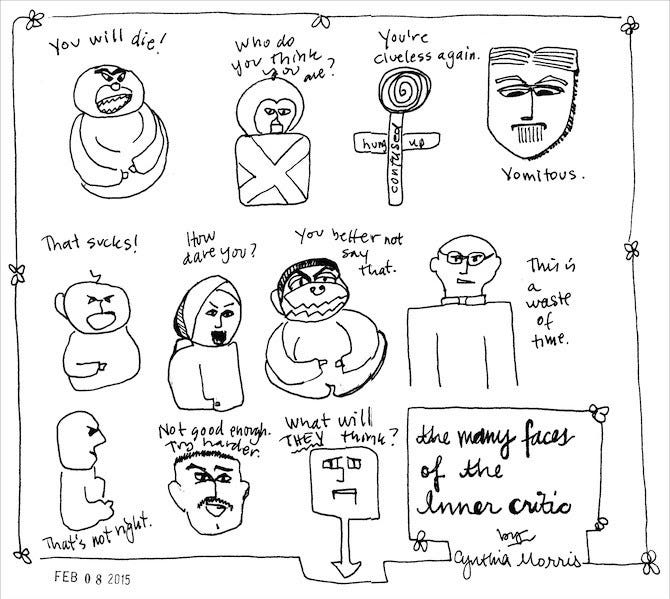“You have suffered enough and warred with yourself. It’s time that you won.”
- Glen Hansard, Falling Slowly
What does your inner critic offer in way of help?
There’s no denying it - we all have a part of us that poo-poos our creative efforts. There doesn’t seem to be an eject button for this part of us. But we can learn to live with it. And, we can enlist its help.
Here’s the method I give my clients to help them free themselves of the grip of the inner critic. They have called it life-changing. Do this process now to have an advanced defense against your inner meany. Or use this as an emergency exercise when you feel paralyzed by fear and insecurities. Then, commit to developing a conscious and healthy relationship with your inner critic instead of letting it squelch your dreams.
INVITATION
Start with the reflective writing and then use other media if you wish to embellish it. Feel free to draw, paint, collage or sculpt this per your medium of choice. Accessing your creativity will make this process even richer for you.
Don’t skip the writing part; it will reveal insights that will help you stay on track. Write your answers to these questions:
Pay your inner critic the attention it craves. Hear it as a distinct voice. Notice its tone. What does it say? What are some of its favorite expressions?
Describe your inner critic. Set a timer for 10 minutes and do a free-write character sketch of your inner critic. Explore what it looks like, where it lives, what it eats. What is its name? What does it wear? Get a clear picture of it as distinct from you.
Get it all out. Brainstorm a list of all your inner critic’s doubts and fears. You could do this as a list or a mindmap. This may take some time, since the inner critic tends to hide once you turn the spotlight on it.
Assert the truth. Next to each doubt or fear, write an assertion about yourself that you know to be true. Example: Doubt: I am too old to do this. Assertion: I have a lot of experience and wisdom that contribute to good writing.
Fear: I might be a terrible writer. Assertion: I am open to learning and to seeing how I can develop my writing skills.
Set boundaries with your inner critic. Once you have identified your inner critic, you can design a relationship with it that allows you to do your writing. Send it to the office supply store while you write. Tell it you will listen to it two days after your writing session but not a moment sooner. What boundaries do you want to establish when it tries to sabotage your writing? Be kind but firm.
Find a deflective phrase. Getting into a long discussion/argument with your inner critic doesn't do any good. I’ve found it helpful to have a short, crisp response when it tries to contribute to the process. When writing my first novel, it liked to say “That’s not good enough!” I would reply, “That’s okay, I’ll fix it later.” Another one: “Just keep going.” What short phrase can you use to deflect its power?
Keep a sense of humor. When your inner critic shows up, stay light. The inner critic tries to weigh the artist down, and using humor and lightness is another way not to subscribe to the bad news it wants you to believe. Thank the inner critic. Thank it for its input, and keep going.
These last two pieces are life-changing.
Finally, ask its help. Ask and answer these important questions in writing: What does your inner critic want for you? How can it help you? What is its new role on your book-writing team?
Consider that your inner critic holds the key to your creative edge. If your inner critic hounds you about your terrible spelling skills, ask it how it can help improve them. Knowing your creative edge (We’ll come to this in Make.)
Affirmation: I can have an empowering relationship with my inner critic.
In the comments: What has shifted for you as a result of getting to know your inner critic?






Cynthia, thanks for this. I really like the idea of getting my critic to be on my team. Mine doesn't stop me creating but may stop me from showing my work to others.
My inner critic isn't my biggest stumbling block. But ... befriending my IC may offer some good teaching. And I love the idea of getting the critic on my team, like Pamela suggested.